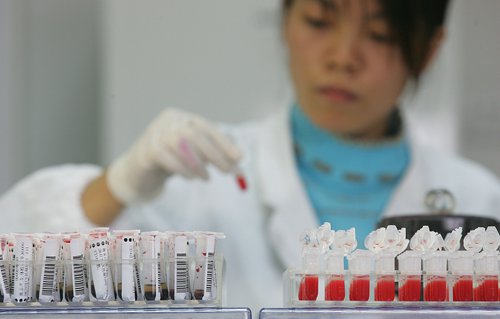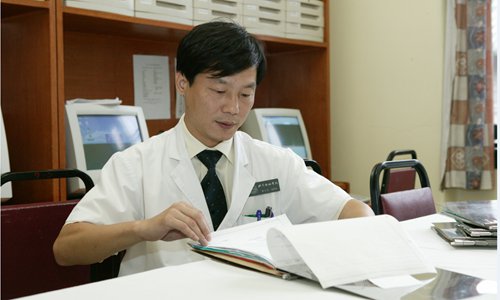
From the People's Daily app.
And this is Story in the Story.
In 2017, an 80-year-old HIV-positive man underwent successful cardiac surgery at the Beijing-based Peking University People's Hospital, under the recommendation of Professor Li Taisheng, the Director of the Infectious Diseases Department in the Peking Union Medical College Hospital (PUMCH).
As one of China's leading researchers and a renowned clinical specialist in HIV, Li said that HIV-positive people's long-term survival has become an important issue in China, now that the disease can be controlled and regulated as a chronic disease like high blood pressure and diabetes.
In the clinic of PUMCH's infections department, a growing number of AIDS patients come to treat their complications.
In 2017, more than 610,000 HIV-positive people received anti-viral treatment, compared to 171,000 in 2012, with a coverage rate of 80.4 percent and a success rate of above 90 percent, according to China's Health Commission.
China has come a long way in overcoming initial stigma of treating AIDS patients.
Today's Story in the Story talks about how the new treatment network is being constructed to provide HIV-infected people better lives.

A researcher checks CD4 cells in the Centre Laboratory of Shanghai Xuhui Central Hospital in Shanghai. (Photo: VCG)
"Our hands were tied. We could only watch our patients die."
Li worked at PUMCH as an intern in 1983 and became a doctor at the hospital the next year. In July 1985, PUMCH accepted China's first HIV-positive patient. "A batch of patients died every couple of months, since there was no medicine for the disease in the world," Li said.
"Doctors and nurses never entered the patient's ward, and a small window in the wall next to the door was used to take blood samples and pass food and daily supplies," said Fu Yan, the head nurse at Beijing YouAn Hospital.
In 1998, Beijing YouAn Hospital introduced Highly Active Anti-Retroviral Therapy (HAART), also known as cocktail therapy, a combination of three or more anti-viral drugs to restore the damaged immune systems of HIV-positive people in order to prolong their lives.
The five patients who made up the first group of HIV-positive patients to receive the therapy in 1998 are now leading normal lives.
However, the therapy was not accessible to everyone due to its high price and the scarcity of anti-viral drugs. Li said that there was no free medicine for HIV-positive people in China until 2004. A bottle of medicine cost as much as 10,000 yuan ($1,450) at that time, which was unaffordable for most families.
China began its research into generic anti-AIDS drugs in 2002. However, its homemade generic drugs caused severe side effects.
Forty percent of the first group of 3,000 patients who took the free medicine from Central China's Henan Province showed nausea, vomiting, liver function damage and other side effects. They required withdrawal treatment, and at the same time, foreign media and NGOs published exaggerated reports on China's generic medicines.

Professor Li Taisheng, director of the Infectious Diseases Department at the Peking Union Medical College Hospital. (Photo: Courtesy of PUMCH)
In the international community, Favirenz (EFV) was designed to contain 600 milligrams in a pill. In 2015, Li found that due to Chinese people's different constitutions, the volume suggested in other countries was too much, and that a more suitable content was 400mg. Additionally, in China, Hepatitis C tends to appear along with AIDS, something that rarely occurred in other countries.
In 2017, a pharmaceutical factory based in Shanghai, East China, decided to help solve the problem by introducing a production line of 400mg EFV, and the medicine was approved at the beginning of 2018.
So far in 2019, more than 50,000 people have taken the medicine.
Zidovudine was found to prevent bone marrow formation six months after taking it, and Stavudine causes lipoatrophy up to one and a half years later.
A "shifting therapy" was then proposed, in which patients are given Zidovudine for five months before the side effects kick in, and then shift to Stavudine. Six months later, they go back to the previous medicine.
While the treatment had the same positive effect, the side effects were dramatically reduced.
The therapy was then made available in the whole country, benefiting more than 20,000 people.
Li announced proudly at a China-French medical seminar that AIDS has now become a chronic disease like high blood pressure and diabetes. An HIV patient can now survive for decades if he or she keeps taking medication.
Li also stressed, "Now that the survival problem of HIV-positive people has been solved, medical workers should focus on how to give them better lives. AIDS patients should be treated like normal patients."
In order to bring about normalized management for HIV patients, preparations are being made to set up a nationwide AIDS complication alliance. The alliance will serve as a platform for training, cooperation and clinical research.
(Produced by Nancy Yan Xu, Da Hang, Lance Crayon, Brian Lowe and Chelle Wenqian Zeng. Music by: bensound.com. Text from Global Times.)


